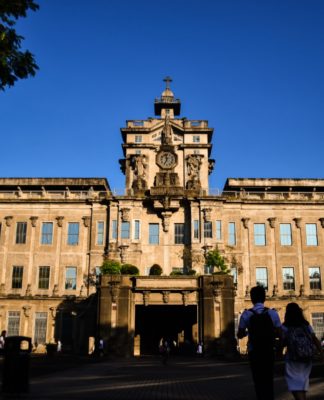THE FUTURE of humanity passes by way of the family.
That future lies in Asia, said Arch. Orlando Quevedo, who stressed family values, growing population and close-knit family ties in the region in the face of biotechnology’s effects on family lifestyles around the world.
“Asians continue to value marriage as a sacred covenant between man and woman. Children are lovingly treasured as gifts of God. The nuclear family is still very close knit, and such closeness reaches to the extended family,” said Quevedo, secretary-general of the Federation of Asian Bishops’ Conferences, during the International Conference on Bioethics and the Family at the EDSA Shangri-La Hotel last Jan. 9 to 10.
“There is great respect for the elderly who are deeply cared for and honored within the family setting. The hospitality of the Asian family is proverbial, no matter how poor the family may be. High stability, resilience in the midst of difficulties, and deep yet simple religiosity characterize the Asian family,” said the Cotabato archbishop.
Meanwhile, Bishop Elio Sgreccia, president of the Holy See’s Pontifical Academy for Life, stressed that despite its scientific advancements, biotechnology should not undermine the dignity of life for the sake of innovation.
The chief Vatican bioethicist said that bioethics, while facing “a number of delicate issues due to advancements in genetics . . . should never lose sight of anthropology that sees man in the image of God.”
According to John Smeaton, UK director of the Society for the Protection of Unborn Children, Pope Paul VI, in his encyclical Humanae Vitae, has foreseen the outcome of “pro-choice” alternatives.
“In the UK, abortion and birth control drugs are provided to children under 16, even those enrolled in Catholic schools.” Smeaton said. “Contraception is at the heart of struggle for the future of the European family. Governments are imposing contraception and abortion on populations, the promotion of abortifacient drugs as contraceptives is often overlooked, and opposition to other attacks on human life has been undermined and weakened.”
The lack of recognition on the beginning of life in the West, according to UST College of Rehabilitation Sciences Regent and Southeast Asian Center for Bioethics president Fr. Fausto Gomez, O.P., has lead to abortions.
In contrast in the Philippines, upon conception, the human embryo already has rights protected by the Constitution.
“Even before birth, the human embryo must be treated by all other human beings—including researchers, technicians and doctors—with utmost respect,” said Gomez.
In his paper, “The Dignity of the Human Embryo: Bioethical Implications of the New Bio and Reproductive Technologies,” Gomez said that at the top of every medical experiment, priority should be placed on saving the life of the patient.
“Every medical intervention aimed at serving life, curing illness or simply improving the quality of precarious life is ethically justifiable and even at times obligatory. But when it begins to destroy the life or bodily integrity or treats the embryo as an object, the intervention ceases to be justified,” Gomez said.
Fall of birthrates, rise of STD
Some sectors in the United Nations (UN) and the European Union (EU), through the Cairo and Beijing conferences held in September 1994 and 1995 have been lobbying for the institutionalization of abortion and contraception, according to International Catholic Migration Commission president John Klink. This contravenes the UN Declaration of the Rights of the Child appropriating “legal protection before as well as after birth.”
“Without a doubt, the Cairo and Beijing documents have established abortion as an international human right,” Klink said in his paper, “21st Century Threats to Life and the Family: Biotechnology and International Organizations and Systems.” “Anti-life advocates have blatantly promoted abortion and pressured traditionally pro-life countries to legalize abortion under the cloak of disguise.”
“Countries are pressured to legalize contraception and abortion by the UN Treaty Compliance Committees,” Klink said. He also said that dominant member-states of the EU promote the ‘culture of death’ in Europe, with the exorbitant taxes it imposes on European countries with legislation against pro-choice alternatives.
“From about 1990 onwards the EU decided to shift toward required adherence to new ‘progressive’ social norms. Thus, the traditional family and life-supportive policies of individual European states began to be quickly compromised, despite the fact that many founding EU states such as Ireland and Germany still have the natural family enshrined in their constitutions,” Klink explained.
With the rise of abortion rates and the general accessibility of contraceptive drugs, illicit sex has also opened the doors to more cases of sexually transmitted diseases.
“Contraception allowed unlimited sexual activity due to the abuse of people’s control of their fertility and social acceptance of casual sex,” said International Right to Life Federation chairman Dr. John Willke. “Also, human life is no longer an absolute value. It is no longer sacred. When we devalue human life at it’s beginning, then we find it easy to justify eliminating human life nearer its end.”
In his paper, “From Contraception and Abortion to Euthanasia: A Global Review,” Willke said that the contraceptive mindset has made casual sex a commodity, along with contraceptives and abortion.
“The result has been a flood of new sexually transmitted diseases and a drastic drop in birth rates around the globe. With these realities, human life has been cheapened due to increasing incidents of abortion and euthanasia,” Willke said.
Also discussing biotechnology and its relation to legislation, law, ethics, philosophy and religion were Manila Archbishop Gaudencio Cardinal Rosales, former Varsitarian Literary editor and senator Francisco Tatad, Heritage Foundation family and religion expert Patrick Fagan, Pontifical Academy for Life president Bishop Elio Sgreccia, Massachusetts Institute of Technology professor and cancer specialist Dr. James Sherley, and Doha Institute for Family Studies and Development managing director Dr. Richard Wilkins.
















